Diplomatic Bluebook 2015
Chapter 2
Japan’s Foreign Policy that Takes a Panoramic Perspective of the World Map
2.Situation of Latin America and the Caribbean Region
(1) Political situation
Presidential or general elections were held in El Salvador, Costa Rica, Panama, Colombia, Brazil, Bolivia, Antigua and Barbuda, Uruguay and the Commonwealth of Dominica in 2014 (for the details on changes of the government, see Figure “Major events in 2014 (by country/region)” on page 116 In Brazil where the Fédération Internationale de Football Association (FIFA) held the World Cup from June to July, a presidential election was held in October and President Rousseff was re-elected.
Regional integration organizations also held various high-level consultations including the 2nd CELAC summit at the end of January, the SICA summit in June and December, and the Ibero-American summit and UNASUR summit in December.
In December, restorting diplomatic relationships between the United States and Cuba was announced and the future developments draw attention.
(2) Regional economic conditions
The economic growth rate of the entire region was 1.1% in 2014, the lowest rate since 2009, but some countries recorded high growth including 6.0% of Panama and the Dominican Republic, 5.2% of Bolivia, 4.8% of Colombia and 4.5% of Nicaragua. On the other hand, the unemployment rate is relatively low (6.1%) and the correction of disparity is in progress with expansion of the middle class and a gradual decrease of poverty thanks to the stable growth of the economy even though the slowdown in 2014.
The growth rate of Brazil which has the largest economy in the region is expected to be 0.3% which is lower than the average rate of the region (1.1%). However, with the 2016 Olympic and Paralympic Games in Rio de Janeiro coming up, the country expects the expansion of domestic demand and revitalization of the economy mainly in the field of infrastructure development. Mexico, which has the second largest economy in the region is also a gateway to the market of the Americas. Companies from around the world including Japan have been entering the country one after another mainly in automobile-related fields. The Peña Nieto administration has energetically been working on the reform of such long-standing issues as financial administration and energy so as to revitalize the domestic economy and expand foreign investment.
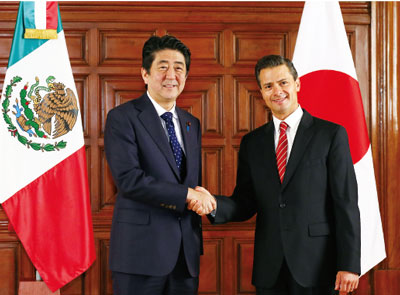 Top-level talks between President Peña Nieto and Prime Minister Abe (Mexico, July 25; Source: Cabinet Public Relations Office)
Top-level talks between President Peña Nieto and Prime Minister Abe (Mexico, July 25; Source: Cabinet Public Relations Office)
The Latin America and the Caribbean region is a major global food supply area in the world and supplies silver, copper, zinc, iron ore, oil and other important resources. The region is a major production area of rare metals such as lithium whose demand is expected to increase greatly in the future for use in the batteries of electric vehicles, for example. In recent years, as major deposits site of shale gas, Argentina (the world’s second largest estimated) and Mexico (the world’s fourth largest) are attracting attention. Countries in the region have high potential in spite of some concerns including the economic condition of Venezuela with the world’s top proved oil reserve, effects of commodity price volatility in the region and stronger government control of resources in some countries. Expansion of the Panama Canal is scheduled to be completed in 2015. The canal is expected to be a key point in world distribution continuously.
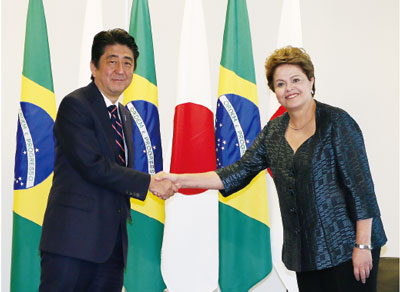 Top-level talks between President Rousseff of Brazil and Prime Minister Abe (Brazil, August 1; Source: Cabinet Public Relations Office)
Top-level talks between President Rousseff of Brazil and Prime Minister Abe (Brazil, August 1; Source: Cabinet Public Relations Office)
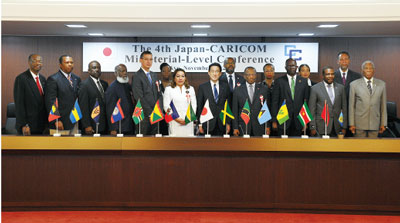 The Fourth Japan-CARICOM Foreign Ministers’ Meeting (Tokyo, November 15)
The Fourth Japan-CARICOM Foreign Ministers’ Meeting (Tokyo, November 15)
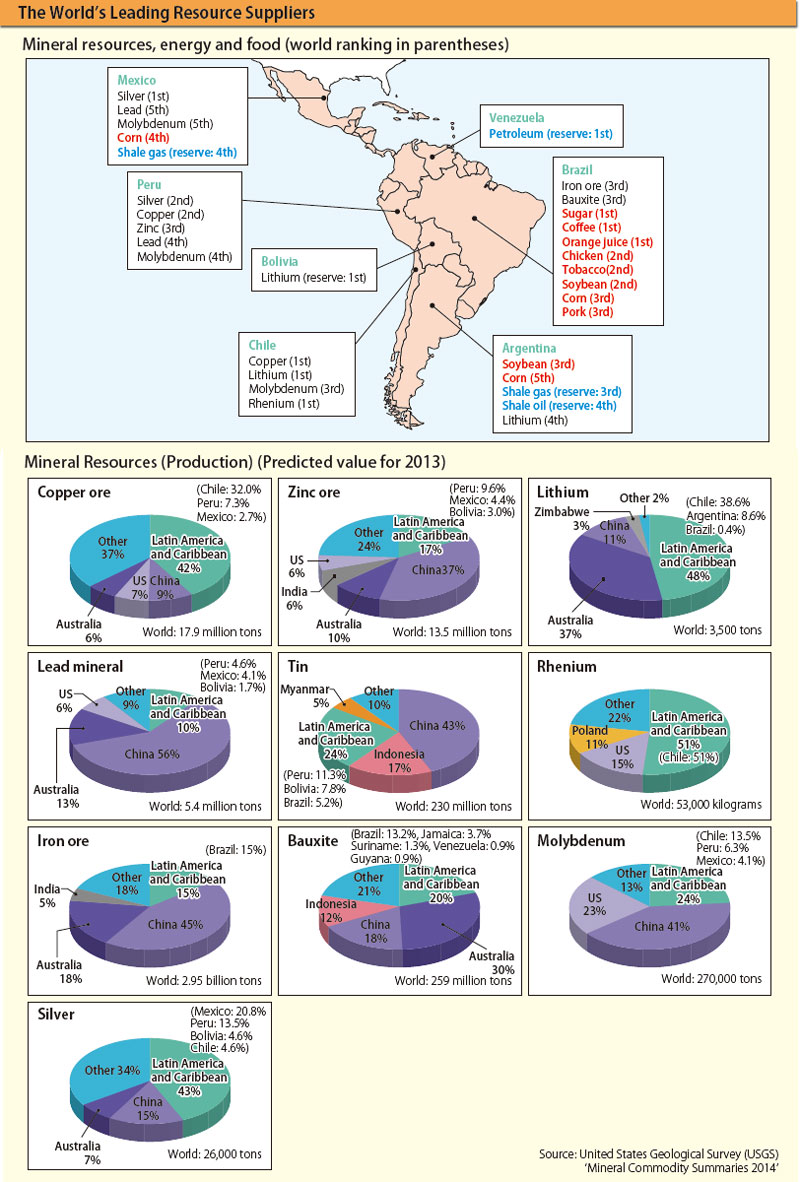
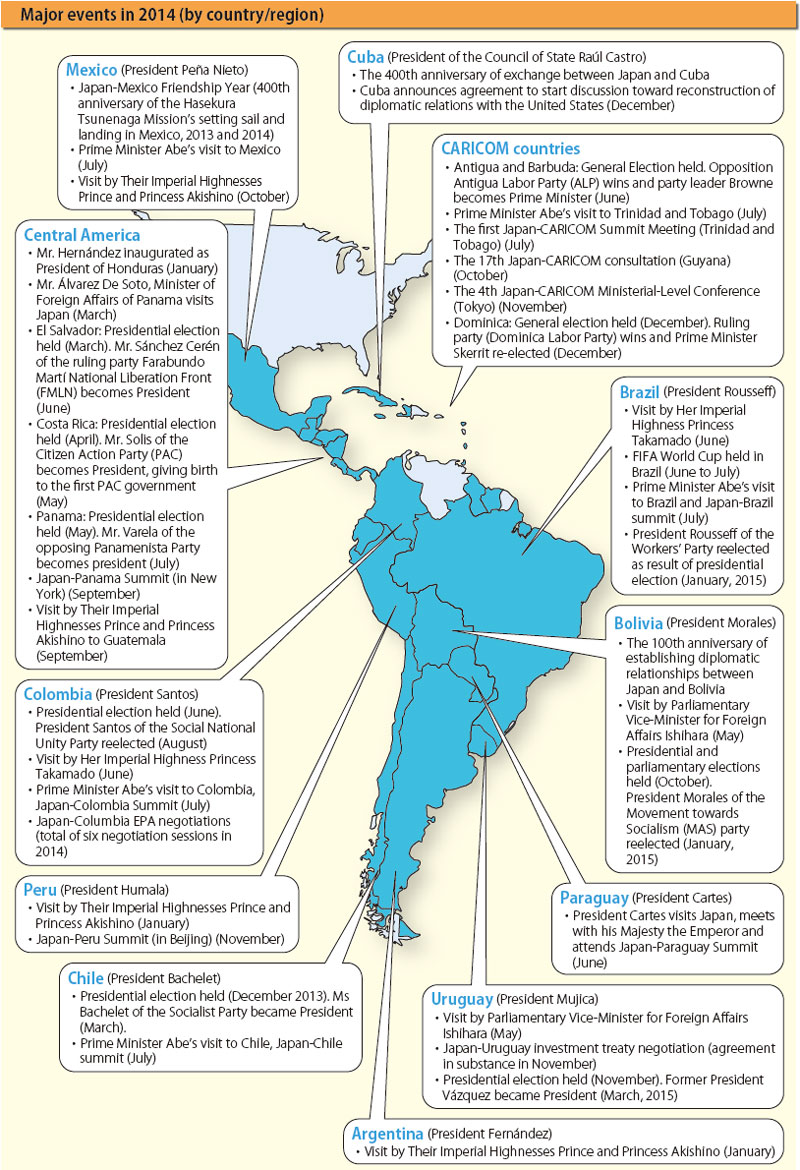
—Is it True that Brazil is a Country of Powerful Women?
Japanese descendants or “Nikkei” across the world are contributing to the development of relationships between Japan and the respective countries in various ways. This article features Mrs. Chieko Aoki, who plays an active role as a leading female business proprietor of the hotel industry in Brazil, which has the largest Nikkei community in the world (having about 1.6 million Japanese descendants).
Since I immigrated to Brazil with my parents at the age of seven, and naturalized, I’ve spent almost entire life as a “Brazilian woman.” Today, I manage the Blue Tree Hotels, which was named after my family name, Aoki (literally means “blue tree”).
Female business proprietors like myself are not rare in Brazil. An old friend of mine, Luiza Trajano is one such woman. She is the owner president of a Brazilian electronics retail chain company that generates nearly 1 trillion yen sales annually. I am a member of a group known as “Mulheres do Brasil” (women of Brazil) which Luiza leads, and through the group, I work to provide support for the entry of women into society with cooperation from both the public and private sectors.
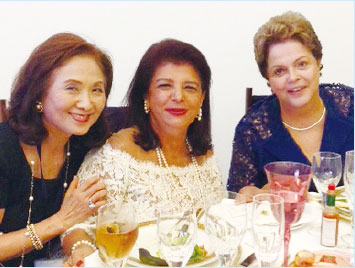 During the meal, President Rousseff (right) and myself (left) were absorbed with CEO Trajano’s talk about her successful diet...?!
During the meal, President Rousseff (right) and myself (left) were absorbed with CEO Trajano’s talk about her successful diet...?!
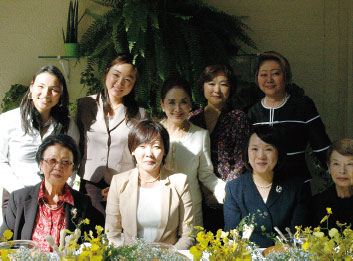 Lunch gathering with the wife of Prime Minister Shinzo Abe and Japanese women active in Brazilian society
Lunch gathering with the wife of Prime Minister Shinzo Abe and Japanese women active in Brazilian society
The first female president of Brazil, Dilma Rousseff is another important partner in this group as representing the public sector. Just the other day, with the aim of obtaining a “feminine perspective and uninhibited opinions”, 80 female business proprietors from this group were invited to the capital Brasilia for an exchange of views with three female Ministers about topics such as improving the standard of education in Brazil, fostering female business proprietors and executive officers, and approaches to philanthropic activities. Although our group comprises only women, it does not, by any means, represent any ideas of pitting ourselves against men.We work at the basis of feminine strength, which cultivate human resources and make good use of them aiming to improve the overall society of Brazil.
In Brazil, which has the world’s largest Nikkei community, Nikkei women also play active roles in various areas of society. Last August, when Prime Minister Shinzo Abe visited Brazil, I invited such active Nikkei women to my house for lunch with first lady Akie Abe (Since it was a rare opportunity, I served the Brazilian cuisine feijoada (a stew of black beans and pork). During the lunch gathering, we exchanged views about the movement of Brazilian active women into society.
It is often said that men enjoy competition, while women prefer harmony. Today, with the demise of an era of simply bashing our way forward, the women’s way of thinking which aims to “avoid competition, involve their fellows, and create better places all together” seems very important for world peace. It might be relevant to the Brazil’s history which is not so much related to wars that women are playing active roles in various parts of the country.
In Brazil, people say that the Japanese women rank first as the ideal woman that people wish to marry. I sincerely hope that Japanese women, who have such strong potential, can become a role model, as the most ideal image, for women all over the world by playing active roles both at home and in society.
The year 2015 marks the 120th anniversary of the establishment of diplomatic relations between Japan and Brazil. I think that there are many aspects of Brazil that can serve as a useful reference for the people of Japan, including this feature on supporting the active roles of women through public and private sector cooperation. I would be delighted to see more people get interested in Brazil and visit this country.
Muito obrigada! (Thank you!)
Chieko Aoki,
President and CEO of Blue Tree Hotels and Resorts

